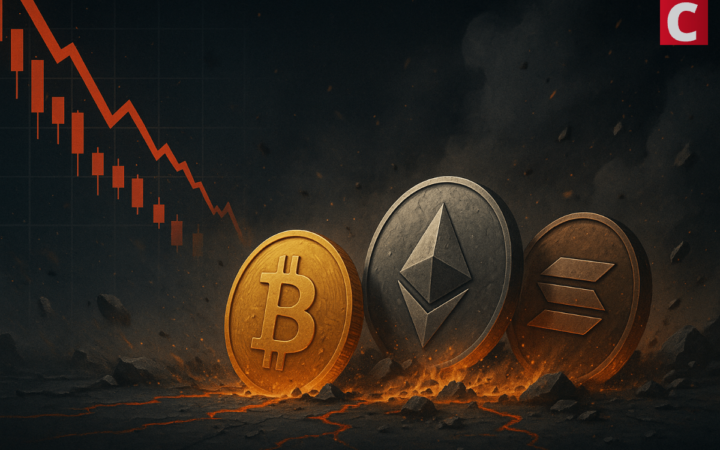
Cross-exchange data from CoinMarketCap shows almost seven percent drop in the USD price per Bitcoin, with 1 BTC worth $2,475 and market cap constituting slightly more than $41B at a press time.
It’s the lowest point since last Thursday when it hit a low of $2,276.16. However, despite the digital currency has been traded just below $2,500 during last month, it still more than doubled in value for the year.
Ethereum also loses around seven percent in USD price making $199 for one ETH with market cap of slightly more than $18,6B.
It should be noted, that across the top ten cryptocurrencies, broad losses underwent not only Bitcoin and Ethereum, but also Ripple, loosing almost 12 percent of its cost in the lowest point. For the context, the total market cap of all cryptocurrencies makes around $84.7B at a press time.
What’s the Matter?
Possible Bitcoin split, scheduled on August 1, must be the answer. Last Thursday, more than 80 percent of developers signaled support for BIP91, a bitcoin improvement proposal intended to resolve differences between the Aug. 1 User Activated Soft Fork and SegWit2x.
BIP 91 will double the maximum number of transactions on the bitcoin network without touching the hard-coded 1-megabyte limit. SegWit SegWit therefore will cleverly cleave off chunks of transaction data and free up space for more transactions. As SegWit doesn’t change the size on block, some people consider it to be a superficial decision.
In fact, SegWit paves the way for “layer two” solutions that will allow speedy and voluminous transactions to take place outside the bitcoin network, which troubles crypto enthusiasts. This creates a scenario in which most transactions take place off the bitcoin network, with the occasional settlement transaction on the network.
This must have served as a prerequisite for a group of investors and entrepreneurs to create “Bitcoin Cash”, a competing version of Bitcoin, starting next week. Bitcoin Cash is set to increase the limit on the number of transactions that can be processed by the Bitcoin network every 10 minutes.
The plan would lead to emergence of two competing virtual currencies going by the name of Bitcoin. In fact bitcoin and bitcoin cash could end up like ethereum and ethereum classic – two separate but viable coins that originated from the same blockchain, of course, in case miners support bitcoin cash, or it will simply fade away if its transactions rejected.
The intention to increase the size of the blocks faces intense opposition from the programmers who maintain the Bitcoin software. Core developers stick to the idea, that increasing the amount of data included in each block of transactions would make it harder for individual users to process the blocks and easier for a small number of companies to take control of the Bitcoin network, which destroys the Bitcoin ethos of being open and permissionless, where nobody has the power to command.
“I actually think it would be a good thing if there is a split,” in contrast said Roger Ver, a Tokyo-based investor who voiced his preliminary support for Bitcoin Cash.
To his opinion, the differences between the different camps had quite likely grown too stark for them to move forward together.
Until now, Bitcoin has remained the most valuable digital token keeping its followers united by a single set of rules, despite all the warring behind the scenes. The divisions, though, appear to have grown too stark to keep everyone on the same blockchain, as the ledger of all Bitcoin transactions is known.
All in all, to work out Bitcoin Cash will have to win backing from the broader community of Bitcoin miners. If so, every current holder of Bitcoins will have access to an equivalent amount of Bitcoin Cash, but from that point forward the two systems will diverge.
FYI a small number of exchanges have already begun trading futures contracts, based to the expected price of Bitcoin Cash. On Tuesday, it was trading around $450.
Meantime, this “fork-or-no fork” situation caused thirteen Japanese bitcoin exchanges together with over 5,000 retail stores and restaurants plan to halt bitcoin transactions on August 1.
Disclaimer: Coinspeaker is committed to providing unbiased and transparent reporting. This article aims to deliver accurate and timely information but should not be taken as financial or investment advice. Since market conditions can change rapidly, we encourage you to verify information on your own and consult with a professional before making any decisions based on this content.





